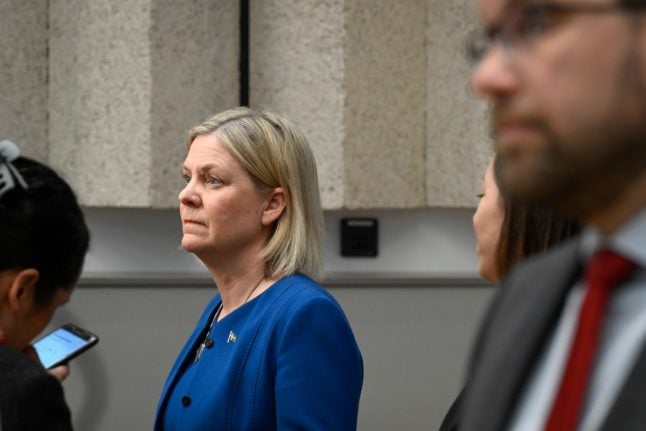Andersson dramatically stoked up her rhetoric in a debate article in the Dagens Nyheter newspaper that seemed timed to lead into the first TV party leader debate since the start of December.
“Sweden is controlled today by politicians who have long had totalitarian regimes as their models, and we are now seeing how their totalitarian dreams are starting to take form,” she wrote.
“The developments we are seeing in Sweden today are in line with how authoritarian, right-wing regimes act around the world, where the opposition, the media, and academia are silenced, all in the name of strengthening their own power.”
In the party leader debate on Sunday evening, Andersson then doubled down on her critique.
“What we are seeing now is the Viktor Orbán handbook, which you are now, step by step, bit by bit, being inspired by,” she said. “There’s a crackdown on LGBTI people, on civil society, you are bearing down on journalists, on academia, you attack people in government agencies and call them activists.”
Right-wing counter attack
The right-wing government and its allies then immediately went on the counter-attack, accusing Andersson of herself undermining democracy with her scare-mongering rhetoric.
“This sounds like a kind of Trump-style debating [technique], where one accuses one’s opponent of being democratically questionable,” Kristersson said during the SVT debate. “Two people can believe different things but don’t suggest that the other side really wants to uproot democracy. Don’t play with that fire. It’s dangerous.”
Johan Pehrson, leader of the Liberals, the junior party in the government, falsely accused Andersson of claiming that Sweden had been victim to a kind of “state coup”.
Andreas Johansson Heinö, who heads the publishing arm of Timbro, Sweden’s leading right-wing think-tank, told TT that he had found the debate a “depressing sight”.
“This is extremely powerful rhetoric because Hungary is the symbol for an authoritarian development, a land which has been downgraded on the democracy rankings,” he said of Andersson’s attack, before attacking Pehrson’s characterisation.
“She never spoke about a state coup. Those were Johan Pehrson’s own words and that ups the ante again because he’s misrepresenting what she’s saying,” Heinö said.
He noted that Ulf Kristersson had himself accused the Social Democrats of “messing about with democracy” in 2021 after they struck the January Agreement with the Green Party, Centre Party and Liberals.
“There’s nothing democratically questionable about either the January Agreement or the Tidö Agreement,” he said. “It’s poppycock from both sides.”
Did Andersson have a point?
In a sense, Heinö is himself guilty of misrepresenting Andersson, as she was not criticising the structure or even the contents of the Tidö Agreement, or citing it as evidence of the government’s and the Sweden Democrats’ authoritarian leanings.
The actions from the government and the Sweden Democrats which she named as being anti-democratic include:
- The Sweden Democrats threatening to strip government funding from the rights groups that criticised the contents of the Tidö Agreement. Sweden Democrat politicians Björn Söder and Martin Kinnunen threatened to do this in October.
- The Sweden Democrats attacking the legitimacy of journalists and threatening to punish journalists.
- The Sweden Democrats calling the non-political heads of government agencies “activists” and threatening a “spring clean of Sweden’s government agencies”, which the SD politician Björn Söder has done.
- The government in April shortening the time in office for external board members at Sweden’s universities from three years to 17 months.
- The government’s plan to launch an inquiry into changing the law to ban the lottery system which was the source of nearly half of the Social Democrats’ party income in 2021. While the government parties have claimed that the inquiry is not directed at a single political party, the Sweden Democrats Tobias Andersson said that the aim was to “snatch away the money tap which finances Social Democracy”.
Even Ulrica Schenström, the Moderate Party politician who was chief advisor to Moderate Prime Minister Fredrik Reinfeldt, has protested the last of these measures as worryingly authoritarian.
“What’s being proposed reminds one of regimes which deliberately use government power to weaken and in the end defeat their political opponents,” she wrote on Facebook.


 Please whitelist us to continue reading.
Please whitelist us to continue reading.
Member comments